QuestionHello Labman-I just have a follow up question from the first answer that I got down below. I have included my original question/Expert Answer to provide more info....
Is this really "Crate" Training
Question: Good Evening, I am a new puppy parent of a 9 week Shichon (Shi Tzu/Bichon Mix)and I want to housetrain him. I work 8 hours a day and wanted to try this, but don't know if this will be successful in training him, so PLEASE ADVISE. I have measured a small area in my living room, with tile, that I will close off for the puppy. I will place the crate in this area and keep the door of the crate open with a pee pad outside of the crate. While I am at work, the crate door will remain open and the puppy can have reign of that small, confined space and use the crate as his den when need be and use the pee pad to potty. In the Morning, he will get his first meal and some play time outside the area (VERY supervised), eat once during the day (on my lunch break) and in the evening when I get home and have our play time and exercise. For the night, I will close the crate door and wake two times in the night to let him go potty on the pad. Is leaving the door of the crate open ok, or is that defeating the whole point? Even with the confinement of the area? I want to eventually train him to go outside, once he has had all his shots. Is this really crate training him? I just don't want him to not have any free area during the work day, but want him to be safe and confined at some point. Additionally, I want him to be comfortable being in a crate because we will travel fairly often.
--------------------------------------------------------------------------------
Answer Hi Tiffany,
I think if he cooperates it will be fine. I would not use the crate in the daytime and then again at night, that is way too much IMO. Hopefully he will not get confused and use the crate as a bathroom area.
The term crate training means to get him acclimated with it and that sounds like exactly what you are doing.
Elaine Allison CPDT NADOI
Canine Behavior Consultant
FOLLOW UP QUESTION:
So, when you say not using the crate in the daytime, do you mean not to have the crate in the confined area at all? Will putting a crate in the area, only at night, cause more confusion? Ultimately, after my puppy has all of his shots, how will I begin the transition outside. Finally, is there a better way with me working during the day. I just don't want to set myself back in the training process. Thanks again for all your feedback. I am taking it to heart.
ANSWER: This is a little confusing. I just added a comment to the original answer, but I don't think you can read it until tomorow and maybe not for a few more days.
I have been very successful leaving 7 week old puppies in a crate all day as long as I could make it home for lunch to give them a break. That is what I suggest you do. The wee pads only make the transition to outside confusing and harder.
One of the reasons I fenced my yard is that it keeps stray dogs out of my yard. That makes it safer for my young puppies. One sniff where a sick dog relieved itself in the last 6 months is all it takes to give a life threatening disease to a puppy. Still, unless the area you have available is frequented by stray dogs, just go ahead and start taking it outside.
Much of housebreaking is not training the puppy, but making it easier for your puppy, you, and your carpet while its body to catches up to its instincts. At around 8 weeks when the puppy goes to its new home, the time from when it realizes it has to go, and when it can't wait any longer is a matter of seconds. Only time will fix that. You can hardly be expected to be attentive enough to avoid all accidents. There is no sense punishing the puppy for your inattention. It is not fair to punish you either, but you still have to clean it up if you didn't have the puppy outside in time.
Housebreaking starts before you get home with the new puppy. If you don't have a crate, buy one. I prefer the more enclosed, den like plastic ones. Skip the bedding. At first it gets wet, and later it can be chewed into choking hazards. A wire grid in the bottom will help keep the puppy up out of accidents at first. They are available with the crates, but expensive and hard to find. A piece of closely spaced wire closet shelving from a home supply place is cheaper. I am now using a plastic vegetable bin with plenty of holes drilled in the bottom. It helps block off part of the crate for the smaller puppy. If you already have a metal crate, covering it may help. Just make sure you use something the puppy can't pull in and chew. Dogs that start out in crates as little puppies, accept them very well. Never leave an unattended puppy loose in the house. If nobody can watch it, put it in the crate. I suggest letting the dog have its crate all its life. A crate needs to be just big enough for a dog to stretch out in.
Choose a command and spot you want it to use. The less accessible to strays, the less chance of serious disease. If it is a female, choosing a non grassy spot will avoid brown spots later. When you bring it home, take it to the spot and give it the command in a firm, but friendly voice. Keep repeating the command and let the puppy sniff around. If it does anything, praise it. Really let it know what a good dog it is and how much you love it, and maybe a treat. Note, being out there not only means you can praise it, but it also keeps it from being snatched by a hawk. If it doesn't go, take it inside and give it a drink and any meals scheduled. A young puppy will need to go out immediately afterward. Go to the spot and follow the above routine. Praising it if it goes is extremely important. If it doesn't go, take it back inside and put it in its crate and try again soon. Do not let it loose in the house until it does go.
At first it is your responsibility to know and take the puppy out when it needs to go. It needs to go out the first thing in the morning, after eating, drinking, and sleeping. If it quits playing, and starts running around sniffing, it is looking for a place to go. Take it out quickly. You will just have to be what I call puppy broke until it is a little older. How successful you are depends on how attentive you are.
By the time most dogs are about 3 months old, they have figured out that if they go to the door and stand, you will let them out. The praise slowly shifts to going to the door. Some people hang a bell there for the dog to paw. If your dog doesn't figure this out, try praising it and putting it out if it even gets near the door. When you catch it in the act, give it a sharp ''Ah, ah, ah!'' and take it out. Clean up accidents promptly. I mostly keep the little puppies out of the carpeted rooms. Still I need the can of carpet foam sometimes. First blot up all the urine you can with a dry towel. Keep moving it and stepping on it until a fresh area stays dry. A couple big putty knives work well on bowel movements. Just slide one under it while holding it with the other. This gets it up with a minimum of pushing it down into the carpet. This works with even relatively soft ones, vomit, dirt from over turned house plants, or anything else from solids to thick liquids. Finish up with a good shot of carpet foam. Note, do not let the puppy lick up the carpet foam. Once the dog is reliably housebroken, your carpet may need a good steam cleaning.
Many people strongly strongly push cleaning up all evidence of past accidents. I am slower to suggest that. Dogs will return to the same spot if they can find it. When you see one sniffing the spot, that is your clue to run it out.
---------- FOLLOW-UP ----------
QUESTION: Hello Labman, I have in the potty training mode for almost three weeks now. We have some days where there are minimal if any accidents in the house and some days there are maybe 3. Even though we are taking the puppy outside often to go and saying "outside potty", he goes. Other times, in the house, he will just squat and go, not even looking or attempting to make the connection that outside is the spot (He's not even looking at the door or going towards it). When will he make the connection that outside is potty? It seems like we are just taking him outside and he's not showing signs of beginning to understand why he's going outside. Are we doing something wrong? Also, should we consistently give him a treat when he goes because sometimes we are just giving high verbal praise. Another question, he is starting to bark and growl when he doesnt get his way, how can we stop that? He will mostly come when we call his name, but he'll run away when we try and grab him.
AnswerThink of potty training a small child. You get them out of diapers, but put them in the thick training pants because there are going to be accidents. I think they just get so busy sometimes they ignore the signals from their bladder until it is too late. It sounds like you are making good progress, but it takes a while. To cope with the inevitable accidents, we ripped out our carpet a dozen puppies ago and put an industrial grade finish on our hardwood floor. That is a little rash for only one puppy.
You need to let it know who is in charge. The key to most behavior problems is approaching things using the dog's natural instincts. Dogs see all the people and dogs in the household as a pack with each having their own rank in the pack and a top dog. Life is much easier if the 2 legged pack members outrank the 4 legged ones. You can learn to play the role of top dog by reading some books or going to a good obedience class. A good obedience class or book is about you being top dog, not about rewarding standard commands with a treat. Start at http://www.dogsbestfriend.com/ For more on being top dog, see http://www.dogbreedinfo.com./topdogrules.htm
For now, you will have to work out of a book. There is too much risk of disease to take a young puppy to an obedience class full strange dogs now. Actually housebreaking is the foundation to obedience following the pattern command, behavior, praise.

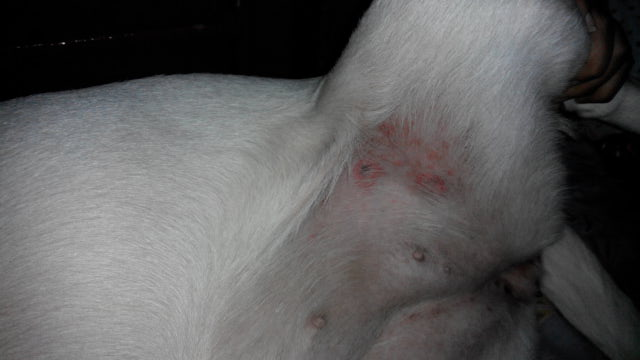 Live worms came out in my dogs poop and he has some rashes?
Question
The Rashes
She is 15 months old and is
Live worms came out in my dogs poop and he has some rashes?
Question
The Rashes
She is 15 months old and is
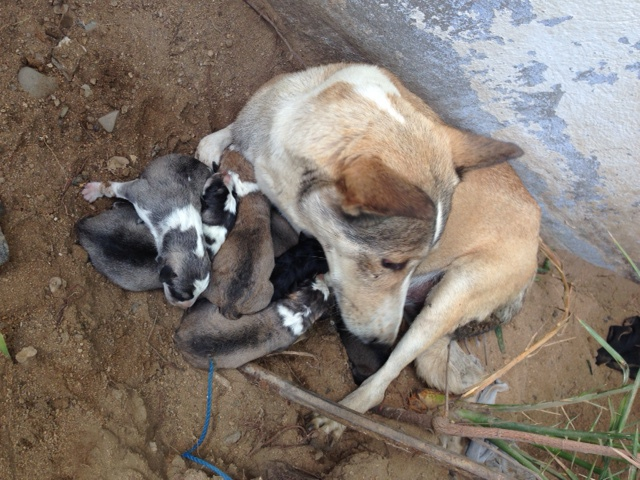 Whats the dog type?
Question
1 2
Dear ma`am,
Me and my friend
Whats the dog type?
Question
1 2
Dear ma`am,
Me and my friend
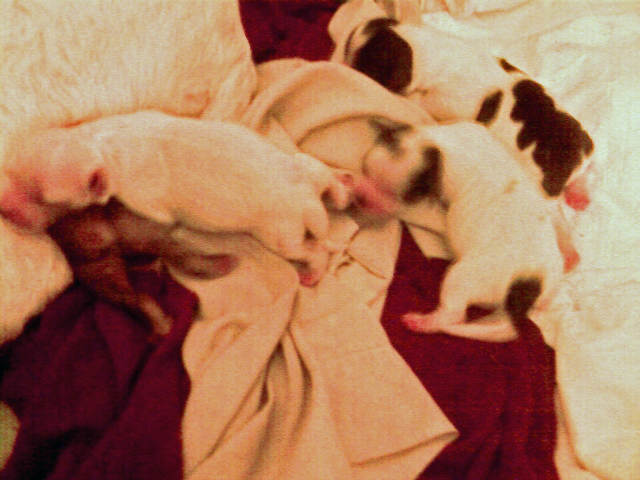 worried about mom dog not lactating enough
Question
angel and her pups jus
I have a small mixed br
worried about mom dog not lactating enough
Question
angel and her pups jus
I have a small mixed br
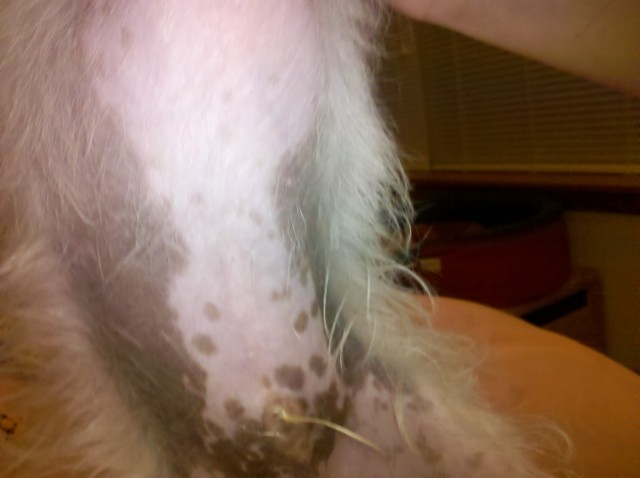 Maltipoo skin color
Question
Cooper
Hello, our family recently found
Maltipoo skin color
Question
Cooper
Hello, our family recently found
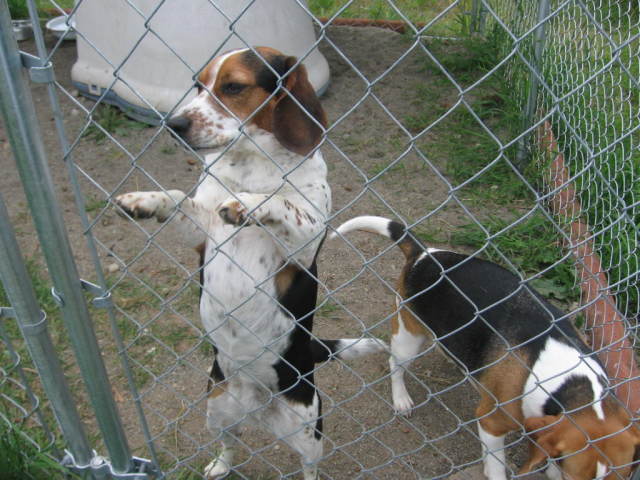 AKC
Question
Bailey and Cocoa
Hi Im Ashley Sommer. I am ten
AKC
Question
Bailey and Cocoa
Hi Im Ashley Sommer. I am ten